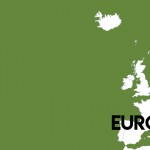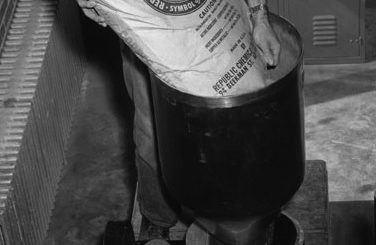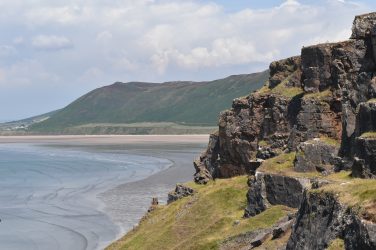For the 50th edition of E&M and, therefore, the 50th edition of LEGS, we talked with Europeans young and old and from vastly different moments of European history to think about how jobs, careers, and travel on the continent have changed or stayed the same over the years.
Roland Wötzel (*3rd June 1938/ 82 years old) became famous because of his involvement in the events of 9 October 1989, when mass protests against the GDR regime shook the streets of Leipzig. As a member of the regional party government, he, together with 5 other Leipzig intellectuals contributed strongly to a peaceful outcome of the tense situation.
E&M: To introduce yourself to our readers – could you briefly describe your own career path?
Wötzel: There were many different stations in my career. I studied political economy and law at the University of Leipzig, and afterwards, I was immediately sent to work in the export section of the mineral oil industry of the GDR. From there, I was promoted to the “Plankommission” – the gremium responsible for the planning of the complete GDR economy. At the time, we were working on introducing some market-based mechanisms into our socialist system, which wasn’t welcomed by Moscow. When our plans were crushed by the Soviet hardliners, I asked to go back to Leipzig, where I became a member of the regional government (Bezirksleitung). There, I gradually climbed up the ladder, until I reached, what I think was the height of my career in October 1989 – as the first secretary of the regional government of Leipzig I convinced the chiefs of security and the armed forces not to face the mass protests with violence, which effectively prevented a blood bath. Mind you, the GDR protests took place one year after the Tian’anmen massacre. Still, after the fall of the GDR, I had to retreat from politics. And for the last 25 years of my career, I worked as a lawyer for construction law in what was now a completely new political system for me.
E&M: What would you say were the main factors for your personal success? Hard work, talent, opportunity, luck or connections?
Wötzel: The most important point to mention is the GDR policy to get children of working class families into academic institutions. They wanted to break the so-called “educational monopoly” of the bourgeouise and made the children of the less-well off go to high school and university regardless of previous performance. Coming from a farmer’s family, I was lucky to be part of this program. But as soon as I got to university, I developed a strong desire to perform really highly – and this required lots of work and discipline. Many inspiring teachers and some older study mates, who’d all been involved in the war and were thus more experienced, shaped my curiosity and made me learn fast.
E&M: In your everday work life, what motivated you: a great goal? personal status? interest in the work itself?
Wötzel: I was always in functions where I really had an impact. And that’s how I identified myself, as someone who has impact. All the things we were doing were original, they were creative. I was in a lot of planning commissions were pretty much all we were doing was constantly coming up with new policy strategies. I couldn’t stand people who did nothing but criticise new ideas without actually trying to understand them. Luckily, I was always surrounded with other spirited thinkers, that also challenged me and made my work life so interesting.

E&M: As part of your job, you travelled out of the GDR frequently. What did travel mean to you back then?
Wötzel: Well, first of all, my travels were never holiday-like. They were always related to my functions, so while it was of course interesting, it was always in a professional setting. I knew that still, this was a privilege many of my fellow citizens didn’t have. Yet, the question of leaving the country for good was never a serious one. I was convinced that the GDR was the better one of the two German states – it was truly antifascist and it had the potential to actually create a better future. I simply had a fundamental conviction that coloured my experiences abroad. What I always watched curiously was this: where do I see the things I was taught about capitalism? Where is the poverty, the deprivation, the inequality? And I always saw it.
E&M: In the GDR career paths were heavily dependent on party affiliations and often those with other opinions were excluded from advancing. On the other hand, workers and farmer’s children, as yourself, had the unique opportunity to advance into higher positions. Could you describe in your own words, what kinds of social mobility existed and what kind of barriers existed in the GDR?
Wötzel: If you were motivated and worked hard, and you were not openly against the state, your chances were really good. True, the choice is bigger today, but it’s not as though people didn’t advance or that everybody had to work in jobs they didn’t like. In some periods, it was more difficult for some people, for instance in the 50s, when the policy of getting working class children in university was very strict. Many middle-class kids couldn’t study, that is to say, they simply had to wait much longer. It was also harder for religious people. But they, too, weren’t excluded. A former schoolmate of mine was very Christian and ended up in one of the most renowned research institutes for nuclear physics.
E&M: What does meritocracy mean to you?
Wötzel: To be honest, I’m not too familiar with the term. But I know what you might be hinting at – yes, in the GDR, there were too many people that worked in positions they weren’t qualified for. I think that just might be a general problem in advanced societies. In the GDR, too, networks and personal relations mattered. But today, they matter much more.
E&M: Now, finally – we’re interested in how you would go about your life if you were our age today. Which career path would you choose?
Wötzel: (laughs) – If I simply lived my hobbies, I would study theology and philosophy. With that you don’t go far though. Other than that I would want to go into medicine, neuroscience or molecular biology. Some science that is still in its cradle. I would love to contribute to finding cures for rare fatal diseases such as ALS.
E&M: Where would you want to study, and why?
Wötzel: There are several: Paris would be one of them. I like its intellectual tradition. Or Bologna. Just because of the reputation of the university and its traditional spirit. I’m not sure about Oxford or Cambridge. The Anglo-Saxon culture may not be for me.
E&M: What’s your career tip for our generation?
Wötzel: Study something related to resources. For instance something related to water. Water will be important soon, and after that it could be something else. Maybe rare earths or just sand. But I think this will be key in the future.

Luisa (18 years old) and Lucas (20 years old) both grew up in Bonn. They are part of a new European and German generation that only knows the wall from history books and never lived in a world without Schengen. However, being young today also means entering a complex and competitive job market, something both are starting to grapple with.
E&M: Hi! Who are you?
Lucas (20), Germany: I’m a business informatics student at Münster University, but I was born and raised in Bonn.
Luisa (18), Germany: I’m also from Bonn and just graduated high school. Currently I’m doing an internship in a sustainable paper business.
E&M: I’ve always hated this question myself, but: what do you want to do when you’re ‘grown up’?

Lucas: I understand why you hated that question, for me it’s way too early to think about that. I guess you only really know what you want once you start looking for jobs and see what’s out there. Generally, I’m interested in the technological side of project management. What kind of job will that get me in the end? I’m guessing working in some office for some company. As long as it’s well paid [laughs]!
Luisa: Honestly? I have no clue. Something with people. Business, I guess. I’m taking this year off to figure out what I want. There are just so many options. But business seems good to me, because you can do so many different things with it. And my dad studied business, I’ve seen him be very successful. Since he’s been advising me and helping me get internships, that has definitely shaped me – if you see someone succeed, you want to emulate that.
E&M: What at does it take to be successful?
Lucas: Determination – and luck!
Luisa: Why are you asking me, I’m not successful?! [laughs] If I had to pick something, probably connections, so knowing the right people. But I also think it’s important to be open. You never know what happens so sometimes you just have to put yourself out there.
E&M: What motivates you?
Lucas: When things are fun, when I feel like I don’t just have to do them, but want to do them.
Luisa: To one day have a good job. To have a good life, family, house, to live in a nice place.
E&M: Legs isn’t only about careers, it’s also about a different kind of exploration – travel. What does travel mean to you?
Lucas: I’ve travelled quite a bit, I went to secondary school in the UK for a year and spent a couple of months exploring Asia in 2019. I think the ability to travel freely is such a core part of what it means to live in Europe, to be European. At least before COVID, you could take a plane or a train and go anywhere you want. And when you travel you meet so many different people, you understand other cultures better and you learn that not everyone is the same – that there is a whole world outside of your ‘bubble’.
Luisa: I love travelling. If things would have gone as planned, I’d be in Canada or England right now, maybe doing an internship. I also wanted to do Interrail. But COVID-19 has rendered me pretty home-bound. In a way, it’s made me realize how used we’ve become to going wherever we want whenever we want.
E&M: Such ease of travel is a relatively new development, especially in Germany. Is that something you ever think about?
Lucas: I studied history in high school, so we talked a lot about European history and about this. Otherwise, no. I grew up in West Germany, long after 1990, to West German parents. This really wasn’t something we talked about. But when I was in Asia, navigating the different visa systems there, I realized how powerful the German passport is, but also how easy it is to travel around Europe in comparison since you don’t need to pass immigration control.
Luisa: Not at all. Now that you say it, sure. And when I visited Berlin, all the places where German history is still more obvious. But this is so far away from my world now; how things are now, that’s what Europe is to me. I can’t really imagine Germany in two parts anymore.
We thank all interviewees for their time. Answers were translated from German and may have been edited for brevity or clarity.










